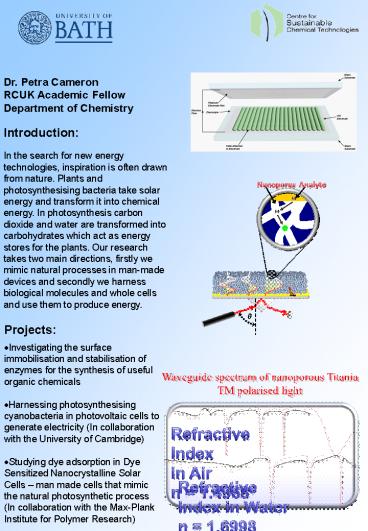Dr' Petra Cameron
1 / 2
Title: Dr' Petra Cameron
1
Dr. Petra Cameron RCUK Academic Fellow Department
of Chemistry
Introduction
In the search for new energy technologies,
inspiration is often drawn from nature. Plants
and photosynthesising bacteria take solar energy
and transform it into chemical energy. In
photosynthesis carbon dioxide and water are
transformed into carbohydrates which act as
energy stores for the plants. Our research takes
two main directions, firstly we mimic natural
processes in man-made devices and secondly we
harness biological molecules and whole cells and
use them to produce energy.
Projects
- Investigating the surface immobilisation and
stabilisation of enzymes for the synthesis of
useful organic chemicals - Harnessing photosynthesising cyanobacteria in
photovoltaic cells to generate electricity (In
collaboration with the University of Cambridge) - ?Studying dye adsorption in Dye Sensitized
Nanocrystalline Solar Cells man made cells that
mimic the natural photosynthetic process (In
collaboration with the Max-Plank Institute for
Polymer Research)
Waveguide spectrum of nanoporous Titania TM
polarised light
2
Expertise
- ? Surface and Interface chemistry
- Surface Plasmon resonance and Optical Waveguide
Spectroscopy - Electrochemistry and Impedance Spectroscopy
Facilities
- As well as all more standard techniques for
surface interrogation (AFM, SEM, TEM) - Surface Plasmon Resonance Spectroscopy and
Surface Plasmon Enhanced Fluorescence
Spectroscopy - Optical Waveguide Spectroscopy
- Fluorescence Microscopy
People and funding
In September 2008 there are 3 PhD students
working on these projects. The students are
funded through the EPSRC, the Max Plank
Gesellshaft and the University of Bath. A
postdoctoral researcher (EPSRC funded) will be
hired in Spring 2009.



























![[PDF] READ Free The Futurist: The Life and Films of James Cameron](https://s3.amazonaws.com/images.powershow.com/10079051.th0.jpg?_=20240716038)

![get [PDF] Download Petra: The History of Jordan's Rose City PDF](https://s3.amazonaws.com/images.powershow.com/10119782.th0.jpg?_=20240904063)

